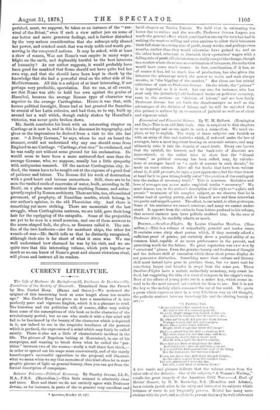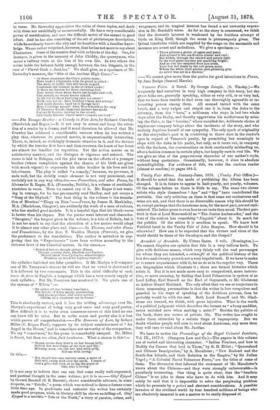POETRY.—Swallow-Flighis. By Louise Chandler Moulton. (Mac-
millan.)—This is a volume of remarkably graceful and tender verso. It contains some sixty short poems, which, if they scarcely afford a sufficient proof of genius, yet certainly show a poetical ability of no common kind, capable of no mean performance in the present, and promising much for the future. No great reputation was ever won by "occasional " pieces. Even the genuine beauty and freshness of thought and the delicate skill of execution which these short poems display do not guarantee distinction. Something more than culture and literary skill must indeed have gone to produce them, but we must wait for something larger and broader in scope from the same pen. Those Swallow-Flights have a certain melancholy monotony, very sweet in- deed, but suggesting the idea of a want of compass in the singer's voice. Most of the efforts of young poets are in a minor key, which seems in- deed to be the most natural snd readiest for them to use. But it is not the key or the melody which command the car of the world. We quote a poem which oxprestes anew in a very felicitious way an old thought, the pathetic contrast between transitory life and the abiding beauty of art:—
"A PAINTED FAN.
',Bose, and butterflies snared on a fan,
All that is lea of a summer gone by :
Of swift, bright wings that flashed in the sun, And loveliest blossoms that bloomed to die ; By what sudtle syell did you lure them here—
Fixing a beauty that will not change
Roses whose petals never will fall, Bright, swift whirl that never will range S' Bad you owned but the Skill to snare as well The swift-winged h furs that came and went, To prison the words that in music died.
And Hs with a spell the hearts content, Then had you been of magicians the chief;
And loved anti i,vets should bless your art. If you could but have painted the soul of the thing,
Not the rose alone, but the rose's heart Flown are those days with their winged delights. As the odour is gone front the summer rose ;
Yet still, whenever I wave my fan, The soft, south wind of memory blows."
A few words and phrases indicate that the volume comes from the other side of the Atlantic. One of the subjects," A Woman's Waiting," recalls the great tragedy of the American Civil War.—A Book of Bristol Sonnets, by H. D. Rawnsley, B.A. (Hamilton and Adams), has a certain justifi,ation in the unity and interest of its subjects which volumes of verse do not frequently possess. Bristol has many asso- ciations with the past, and much in its present that may be well celebrated in verse. Mr. Rawnsley appreciates the value of these topics, and deals with them not unskilfully or unsuccessfully. He has a very considerable power of versification, and uses the difficult metre of the sonnet to good effect. And he has also something of the art of picturesque description, while he evidently knows the city and its localities with a familiar know- ledge. We are rather surprised, however, that he has not more to say about Chatterton. Some of the sonnets deal with subjects of the day. One, for instance, is given to the memory of John Chiddy, the quarryman, who saved a railway train at the loss of his own life. In two others the writer holds the balance fairly enough between the two litigants, in the case of " Flavel Cook v. Jenkins." We shall give, as a specimen of Mr. Rawnsley's manner, the "Site of the Ancient High Cross :"—
" At these crossways the City's pulses meet ;
Here trade's Charybdis with its greed Is rolled ; The wave of trail% that will break in gold, Confounds the listener in the crowded street!
Is there no rhythm for these clattering feet, Does music cease when wares are bought and sold, Can melody no weary hearts uphold, Is life for all these hurrying ones too sweet ?
Birth says not so ; here Southey's harp was strung ! And death denies; hard by is Savage laid!
Here Coleridge mused ! here Wordsworth as he sung Of Tintern's woods, immortal shrines has made For sad Reflection, moving in the crowd, And lonely Silence, where men's tongues are loud!"
—The Younger Brother: a Comedy in Five Acts, by Richard Crawley. (Hardwick and Bogue.)—It is not easy to arrest and keep the atten- tion of a reader by a drama, and it must therefore be allowed that Mr. Crawley has achieved a considerable success when he has written a play that, whatever its general merits, is unquestionably interesting. There, is, indeed, no strikingly dramatic situation in it, and the devices by which the heroine first loses and then recovers the heart of her lover are almost too familiar for repetition. Yet the action moves on in satisfactory manner, and the dialogue is vigorous and natural. The scone is laid in Bologna, and the plot turns on the efforts of a younger brother (whose complaints against the chance of his birth are given with much vigour) to supersede his elder brother in his love and his inheritance. The play is called "a comedy," because, we presume, it ends well, but the strictly comic element is not very prominent, and certainly not in any way offensive.—Prometheus, and other Poems, by Alexander R. Eager, B.A. (Ponsonby, Dublin), is a volume of creditable exercises in verse. More we cannot say of it. Mr. Eager is not want- ing in courage, for be has presumably read Shelley, and yet essays a "Song of the Skylark." The best thing in the volume is the transla- tion of Moschus' "Elegy on Bion."—Poems, by James M. Mackinlay, M.A. (Maclehose, Glasgow), are evidently the work of a man of culture, who has studied good models. It is a hopeful sign that his blank-verse is better than his rhyme. But the poems want interest and character. "Imogene," the longest piece in the volume, is a tale of Britain, but it is not too much to say that the alteration of a few names would adapt it to almost any other place and time.—In neseus, and other Poems and Translations, by the Rev. T. Wadden Martyn (Provost), we give the preference to the translations. The author is mistaken in sup- posing that his "Experiments" have been written according to the strictest laws of the Classical metres. In the stanza,— e Devoted heroes, though savage tEacus, Though queenly Juno, Phoebus and Jupiter, Should show them CycloOan wheelwrights Breaking up wood for aspiring traitors," the syllables italicised are false quantities. If Mr. 31artyn will compare one of Mr. Tennyson's stanzas he will see that no vowel is shortened if it is followed by two consonants. This is the chief difficulty of such tours de force in English, a language which has a very scanty supply of such syllables. But Mr. Tennyson has mastered it. We quote one of the stanzas of " Milton " :— " Ile rather all that bowery loneline,s. The brooks of Eden mazily murmuring, And gloom profuse, and cedar arches Charm, as a wanderer out in Ocean."
This is absolutely correct, and it has the trifling advantage over Mr. Martyn's experiment of being very good sense and very good poetry. How difficult it is to write even nonsense-verses of this kind no one can know till he tries. But to write sense and poetry also is a feat which passes all comprehension.—The Romance of Love, by Robert Miller (C. Kogan Paul), suggests by its subject reminiscences of "An Angel in the House," and is sometimes not unworthy of the comparison. We say "sometimes," for the poem is remarkably unequal. Mr. Miller is fluent, but then too often jluit luculentus. What a stanza is this " manna snows deep heav'n on her bosom billy, Hybrid her face seems of the rose and lily; Horning, noon, eve tint her, and willy-nilly,
Kill me with loving."
"Rut should her—her sorcery cease, a wave of Hell will sweep wild over the earth. I crave of God a gift,—her love, or to dig the grave of
One, who is loving."
It is not easy to believe that one can find some really well-expressed, and poetical thought in the same volume, yet it is so.—Olaf Eyegod by Gerard Bendall (S. B. Barrett), shows considerable advance, in some respects, on "Estelle," a poem which was noticed in these columns some little time ago. In good-taste and restraint the writer has certainly made good progress, while in literary skill he shows no falling-off. Olaf Ejegod is a terrible "Tale of the North," a story of passion, crime, and
Or this,— vengeance, and its tragical interest has found a not unworthy expres- sion in Mr. Bendall's verse. As far as the story is concerned, we think that the dramatic interest is weakened by the fruitless attempt of Gyda on King Erill, though the scene is picturesquely given. The lyrical interludes which are supplied by the songs on the mermaids and mermen are sweet and melodious. We give a specimen :—
"There glitters a grotto of agate and pearl, And around it the sea-flowers cluster and curl; But within, through the shaded and purple light In the roof great crystals are sparkling bright ; And as o'er the carpeted floor you cross, Your feet fall dumb in the soft green moss, Where the white shell nestles, and glittering gem As never was set in a diadem."
—We cannot give more than the praise for good intentions to Poems, by Jane Budge (Samuel Harris).































 Previous page
Previous page